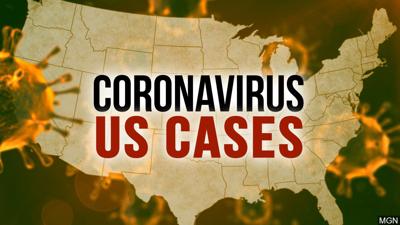Coronavirus Numbers Across The Four States; What You Need To Know

Here’s an update on the confirmed Coronavirus cases across the Four States as of Friday, March 13, 2020.
Missouri:
- Two confirmed cases
- Latest in Greene County on Thursday (3/12). A person in their 20s returned to Springfield after traveling to Austria.
- The first case was confirmed last week in St. Louis County. The patient is a woman in her 20s that recently traveled abroad.
- Zero deaths
Oklahoma:
- Three confirmed cases
- The first case was a man in his 50s in Tulsa County, recently traveled to Italy.
- The second patient is a woman in her 20s, recently traveled to Italy.
- The third patient is an active-duty U.S. Air Force Airman based at Altus Air Force Base that contracted the virus after returning from leave in Seattle earlier this month.
- Zero deaths.
Kansas:
- Five confirmed cases
- Three patients, men 35-65 that recently attended the same conference in Florida.
- Woman from Johnson County.
- One death
- Victim is man in his 70’s that lived in a nursing home in the Kansas City area.
Arkansas:
- Six confirmed cases
- First patient confirmed in Pine Bluff. Recently traveled out of state, but not international
- Four of the newly identified cases had contact with a Pine Bluff patient the state identified Wednesday (3/10) as its first Coronavirus case.
- One of the new cases was a trainee from the University of Arkansas for Medical Sciences who worked at the Pine Bluff hospital where the initial patient is being treated.
-
Public schools in Grant, Jefferson, Pulaski and Saline counties will close for the next two weeks.
- Zero deaths
US Totals:
- Nearly 1,700 confirmed Coronavirus cases in 43 states.
- 40+ deaths in six states.
COVID-19 Testing
Medical providers should contact their local health department if their patient meets CDC criteria [www.cdc.gov] for testing.
Persons in Missouri who meet CDC criteria will be able to obtain testing through the Missouri Department of Health and Senior Services. All requests should be submitted through your local health department.
Testing for persons who do not meet the CDC’s criteria for testing for COVID-19 is available from private laboratories. However, at this time in the state of Missouri, the person requesting testing will be responsible for covering any cost(s) associated with the testing.
How does COVID-19 spread?
Health experts are still learning the details about how this new coronavirus spreads. Other coronaviruses spread from an infected person to others through:
- the air by coughing and sneezing
- close personal contact, such as touching or shaking hands
- touching an object or surface with the virus on it, then touching your mouth, nose, or eyes
- in rare cases, contact with feces
How severe is COVID-19?
Experts are still learning about the range of illness from COVID-19. Reported cases have ranged from mild illness (similar to a common cold) to severe pneumonia that requires hospitalization. So far, deaths have been reported mainly in older adults who had other health conditions.
What are the symptoms?
People who have been diagnosed with COVID-19 have reported symptoms that may appear in as few as 2 days or as long as 14 days after exposure to the virus:
- Fever
- Cough
- Difficulty Breathing
Who is at risk for COVID-19?
Currently the risk to the general public is low. At this time, there are a small number of individual cases in the U.S. To minimize the risk of spread, health officials are working with healthcare providers to promptly identify and evaluate any suspected cases.
Travelers to and from certain areas of the world may be at increased risk. See wwwnc.cdc.gov/travel [wwwnc.cdc.gov] for the latest travel guidance from the CDC.
How to prevent getting COVID-19
If you are traveling overseas (to China but also to other places), follow the CDC’s guidance: wwwnc.cdc.gov/travel [wwwnc.cdc.gov].
Right now, the COVID-19 has not been spreading widely in the United States, so there are no additional precautions recommended for the general public. Steps you can take to prevent the spread of flu and the common cold will also help prevent COVID-19:
- wash hands often with soap and water. If not available, use hand sanitizer.
- avoid touching your eyes, nose, or mouth with unwashed hands
- avoid contact with people who are sick
- stay home while you are sick and avoid close contact with others
- cover your mouth/nose with a tissue or sleeve when coughing or sneezing
Other steps you can do to protect yourself and your family:
- clean surfaces and objects that are touched frequently, including desks, doorknobs, railings, computer keyboards, phones, and toys.
- stay informed about the local COVID-19 situation
- keep informed about your child’s school and childcare attendance policies
- know your employer’s sick-leave policy
Currently, there are no vaccines available to prevent COVID-19 infections.
How is COVID-19 treated?
There are no medications specifically approved for COVID-19. Most people with mild COVID-19 illness will recover on their own by drinking plenty of fluids, resting, and taking pain and fever medications. However, some cases develop pneumonia and require medical care or hospitalization.



